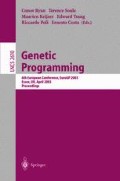Abstract
This paper proposes a constrained-syntax genetic programming (GP) algorithm for discovering classification rules in medical data sets. The proposed GP contains several syntactic constraints to be enforced by the system using a disjunctive normal form representation, so that individuals represent valid rule sets that are easy to interpret. The GP is compared with C4.5 in a real-world medical data set. This data set represents a difficult classification problem, and a new preprocessing method was devised for mining the data.
Access this chapter
Tax calculation will be finalised at checkout
Purchases are for personal use only
Preview
Unable to display preview. Download preview PDF.
References
C. C. Bojarczuk, H. S. Lopes, A. A. Freitas. Genetic programming for knowledge discovery in chest pain diagnosis. IEEE Engineering in Medicine and Biology magazine-special issue on data mining and knowledge discovery, 19(4), 38–44, July/Aug. 2000.
V. Dhar, D. Chou and F. Provost. Discovering interesting patterns for investment decision making with GLOWER-a genetic learner overlaid with entropy reduction. Data Mining and Knowledge Discovery Journal 4 (2000), 251–280.
A. A. Freitas. Data Mining and Knowledge Discovery with Evolutionary Algorithms. Springer, 2002.
D. J. Hand. Construction and Assessment of Classification Rules. Chichester: John Wiley & Sons, 1997.
J. K. Kishore, L. M. Patnaik, V. Mani and V. K. Agrawal. Application of genetic programming for multicategory pattern classification. IEEE Transactions on Evolutionary Computation 4(3) (2000), 242–258.
D. J. Montana. Strongly typed genetic programming. Evolutionary Computation 3 (1995), 199–230.
A. Papagelis and D. Kalles. Breeding decision trees using evolutionary techniques. Proc. 18 th Int. Conf. on Machine Learning, 393–400. San Mateo: Morgan Kaufmann, 2001.
J. R. Quinlan. C4.5: Programs for Machine Learning. San Mateo, CA: Morgan Kaufmann, 1993.
I. H. Witten and E. Frank. Data Mining: practical machine learning tools and techniques with Java implementations. San Mateo: Morgan Kaufmann, 2000.
Author information
Authors and Affiliations
Editor information
Editors and Affiliations
Rights and permissions
Copyright information
© 2003 Springer-Verlag Berlin Heidelberg
About this paper
Cite this paper
Bojarczuk, C.C., Lopes, H.S., Freitas, A.A. (2003). An Innovative Application of a Constrained-Syntax Genetic Programming System to the Problem of Predicting Survival of Patients. In: Ryan, C., Soule, T., Keijzer, M., Tsang, E., Poli, R., Costa, E. (eds) Genetic Programming. EuroGP 2003. Lecture Notes in Computer Science, vol 2610. Springer, Berlin, Heidelberg. https://doi.org/10.1007/3-540-36599-0_2
Download citation
DOI: https://doi.org/10.1007/3-540-36599-0_2
Published:
Publisher Name: Springer, Berlin, Heidelberg
Print ISBN: 978-3-540-00971-9
Online ISBN: 978-3-540-36599-0
eBook Packages: Springer Book Archive

